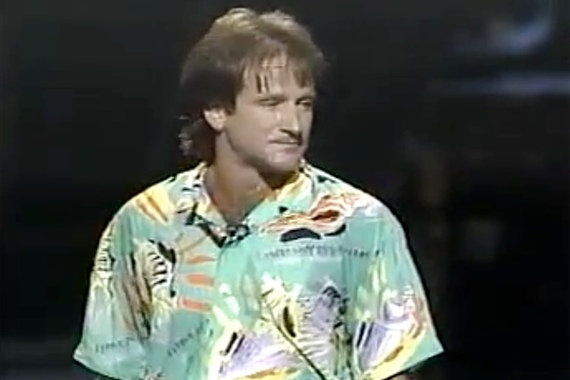Luckily for me, though perhaps not for them, I have had the opportunity to meet, work with, and come to know a few comedians. I was the advance man for Dick Gregory's cross-country Run Against Hunger in 1976 and had a campaign for human rights in Burma take off with the involvement of Jim Carrey in 2007. In 1986, when I was Execitive Director of Amnesty International (AI) USA, I was fortunate to work with Robin Williams. I'd recruited Bill Fertik to put together public service announcements (PSAs) to run before and during AI's Conspiracy of Hope Tour, knowing he'd blend music and celebrity to bring deserved attention to human rights. Many responded to the call, including Marlo Thomas, Meryl Streep, Carly Simon, Sam Waterston, Pat Benatar, Tyne Daly, Jamie Lee Curtis, Glenn Close, Marsha Mason, Richard Dreyfuss, Emilio Estevez, Judd Nelson, Ron Silver, Robert De Niro, Christopher Reeve, Richard Belzer, Elliott Gould, Robin Williams, and others. His first of many PSAs was called the "Wheel of Misfortune." Fertik asked for more and we all watched in wonder as Robin wasn't just an improv dynamo, but seemed to have an internal chronograph. Improvising unscripted thirty second spots, Robin would finish at 29.5 seconds and 59.5 for minute ones. Stunning us all without needed retakes, he was ahead of schedule and hung out to watch other spots.
Cinema legend John Huston showed up with daughter Anjelica. Hampered by illness, he'd breathe hard filming. During break, I asked this Irish hero for a photo and he said he's be "happy to have my picture taken with any ex-priest." I proudly display the photo today. Surprised he knew my history, Fertik said he didn't but that he "is a casting director." Plunging back into the work with word out and limos lined up, celebs packed tighly and began to whinge. Robin asked that everyone "allow real talent to go to work" while John shot and a hush fell instantly. The resulting spots from all were excellent, but it was Robin who kept the boundary at that moment. He later followed the Conspiracy of Hope Tour for a bit and did standup routines in the middle of rock shows. He extended himself to show his strong support for human rights as imperative, not just dross and gloss. He was a presence to contend with and had a voice of authority even then, one noticed by other celebrities, crowds of fans, and human rights advocates.
Since his passing, I have wondered at what might be done. I have said an "Ave" for his family and have thought of the lost kindness and compassion. Larry King once told me during a radio taping at two in the morning, "Jack, when I am off this microphone, there is no one here." It struck me, as he seemed so generally full of life. Robin too was full of life and energy. He cared for people with his talent and his time. Addictions, age, and illness are brutal, but he seemed okay to many of us. Maybe when he wasn't being actively funny or actively serving, he'd felt that nobody was there, that no one was home. I can't imagine his death as other than a poorly thought mistake of "a permanent solution to a temporary problem." He had a legion of fans who found him a fountain for laughter, but he also had a number of us who knew him as a wellspring for support for human rights and human dignity.
Remember those campaign spots he did? They were so successful for so long that his manager called me long afterwards and asked me to take them down. Why? In his manager's words, "Robin does not look that way any more." To me, and to many who knew him, that man, that person who stood and employed humor as a tool to bring presence and freedom and to relieve oppression and absence? That man, Robin Williams, has always looked that way. He always has and he ever shall. May he rest in peace and may we all expand human freedoms. We should all take that page from the book as universal. Who knows what we might have gotten in the future where Robin didn't feel driven to take a sudden exit from the scene. We should do more to protect the dignity of those depressed, of those challenged by illness, of those who need access to the full spectrum of human rights enumerated and implied by the Universal Declaration of Human Rights (UDHR) and other documents. We have to content ourselves with the rich legacy that Robin left behind and to have only speculation about what might have followed from him with humor and hope; we needn't have to wonder about his commitment to make human rights the global reality. We owe it to the globe to keep that commitment ourselves. That is what we can do, now and onward, with humor, with hope, and with human rights as the goal for the entire global family.

